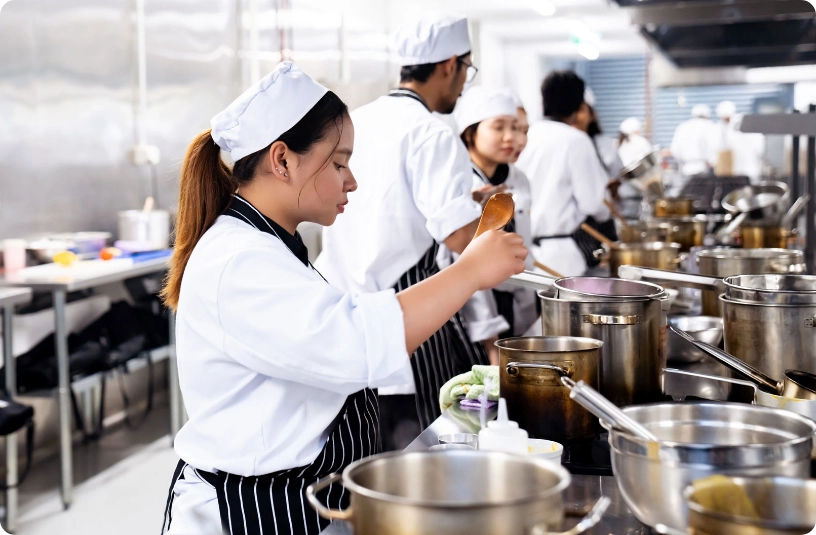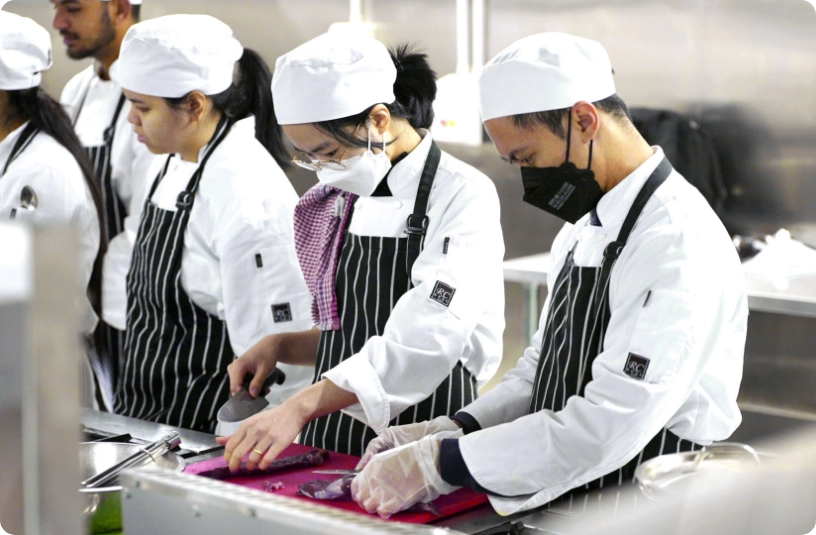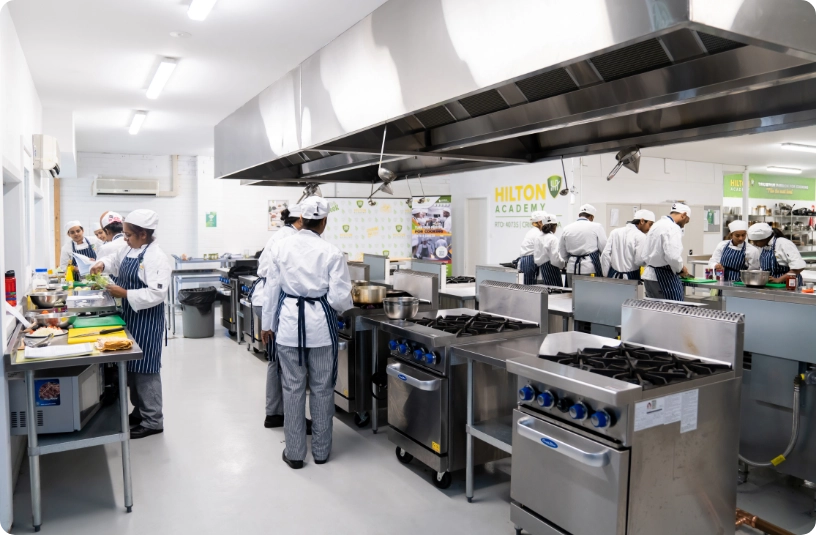


This qualification reflects the role of commercial cooks who use a wide range of well-developed cookery skills and sound knowledge of kitchen operations to prepare food and menu items. Using discretion and judgement, they work with some independence and under limited supervision using plans, policies and procedures to guide work activities.
This qualification provides a pathway to work as a commercial cook in organisations such as restaurants, hotels, clubs, pubs, cafés, and coffee shops.
Students are required to undertake 200 hours of work placement in order to successfully complete this course.
The latest release of the qualification and packaging rules can be found at the following link: https://training.gov.au/Training/Details/SIT30821
There are no specific entry requirements as per the qualification details or training package. International students entering this course at Hilton Academy must meet the following entry requirements:
Age requirements
Students must be a minimum age of 18 years or above at the time of course commencement.
Academic Requirements
To enter this qualification, applicants should have successfully completed an Australian Year 12 (or an international secondary school year which is equivalent to Australian Year 12 with satisfactory results, OR successful completion of a recognised Foundation Studies program in Australia, OR successful completion of the international Baccalaureate Certificate, OR Successful completion of an Australian qualification of AQF level 3. An educational achievement, which is greater than any of these, is also suitable. e.g. Masters Degree.
English Language Requirements
Applicants must provide evidence of completion of the International English Language Testing system (IELTS Test), either Academic (A) or General (G) band 6 overall, or its equivalent completed within 2 years from the application date.
Or:
International students who can prove one of the following criteria are not required to demonstrate their English entry requirements as listed above:
DHA requirements:
Applicants must also provide documentation according to Department of Home Affair (DHA) requirements. For further information on student visa assessment level and documentation, visit Department of Home Affairs’ website at: https://www.homeaffairs.gov.au/
Pre-training review
All international learners will undertake a pre-training review to determine suitability for the course and student needs. The aim of the review is to identify their training needs through questions on previous education or training, relevance of the course to applicant, and relevant experience. The Pre-training review will also aim to identify any support needs and possible RPL opportunities.
Through pre-training review, learners will demonstrate that they have necessary skills to successfully complete the course.
Hilton Academy will identify any such barriers presented by learners during pre-training review and provide required support and reasonable adjustment where possible.
Language, Literacy and Numeracy (LLN) Assessment
All learners will be required to complete an LLN assessment prior to the commencement of the course. – it is a diagnostic process to identify if prospective student requires LLN support during study.
Hardware/Software requirements
Hilton Academy will provide access to computers/laptops during classroom hours, however for learners to work on assessments, tasks and self-study all learners are expected to have access to a laptop or computer with windows operating system and office application like Microsoft word at their own cost.
Note: Some assessment tasks are completed using a computer and internet, and it is advantageous for the student to possess basic computer skills.
Kitchen Toolkit
Applicants will need access to a kitchen toolkit, which includes a chef’s uniform, safety shoes, various knives and small equipment. Students may wish to arrange this equipment themselves or Hilton Academy can provide them a toolkit for an additional cost. Students will need these to undergo the training effectively.
Physical requirements
Applicants will need to be physically able to carry out manual handling required to perform tasks involved while undergoing training. As part of this course learners are expected to handle complex foods – e.g. cooking of various processed or raw meats, poultry, seafood’s, dairy items and student must keep in mind of any religious or dietary barriers to handle such foods before enrolling in this course.
Credit Transfer (CT)
Learners may apply for recognition of existing qualifications or skills, knowledge and experience (credit transfer or recognition of prior learning). The granting of course credit may affect course fees as well as the duration of the course.
This process is outlined in Hilton Academy Student Enrolment & Induction Policy and Assessment Policy.
Recognition of Prior Learning (RPL)
Relates to the learning achieved outside the formal education and training system. It is an assessment process that assesses the individual’s non-formal and informal learning. This may include any combination of formal or informal training and education, work experience or general life experience to determine the extent to which that individual has achieved the required learning outcomes, competency outcomes, or standards for entry to, and/or partial or total completion of, a qualification.
To receive RPL, we assess students’ previous work, education and life experiences against recognised qualifications.
Applications for RPL must be made prior to the commencement of the course – please speak with the Student Support Officer if you wish to apply. There is a fee for consideration of RPL applications.
08th January
12nd February
08th April
13th May
08th July
12nd August
07th October
11th November
For further enquiries please enquire with our marketing team.
Students who complete this course may wish to continue their education into a range of Certificate IV qualifications, such as the SIT40521 Certificate IV in Kitchen Management.
Face-to-face delivery:
This program will be delivered in the classroom. Practical face-to-face training will be provided in a commercial training kitchen.
Delivery site:
Campus Delivery: Level 6, 250 Collins Street Melbourne 3000
Practical Kitchen: Unit 4, 60 Stubbs St, Kensington VIC 3031
Work Placement Training: Location as per individual student agreement
Course duration:
This qualification is expected to be completed in 52 weeks. This will include 40 weeks of face-to-face training and assessment spread over 4 terms of 10 weeks each and 12 weeks of term breaks (accumulative). Students will also need to complete Work Based Training (WBT) as part of their course. Learners will complete 200 WBT hours concurrently in term 3 and 4. There are no additional fees for this work placement.
Hilton Academy has a dedicated Work Based Training Coordinator who will help you arrange your mandatory placement as part of this program.

Potential employment options are as a commercial cook in restaurants, hotels, clubs, pubs, cafés, and coffee shops.